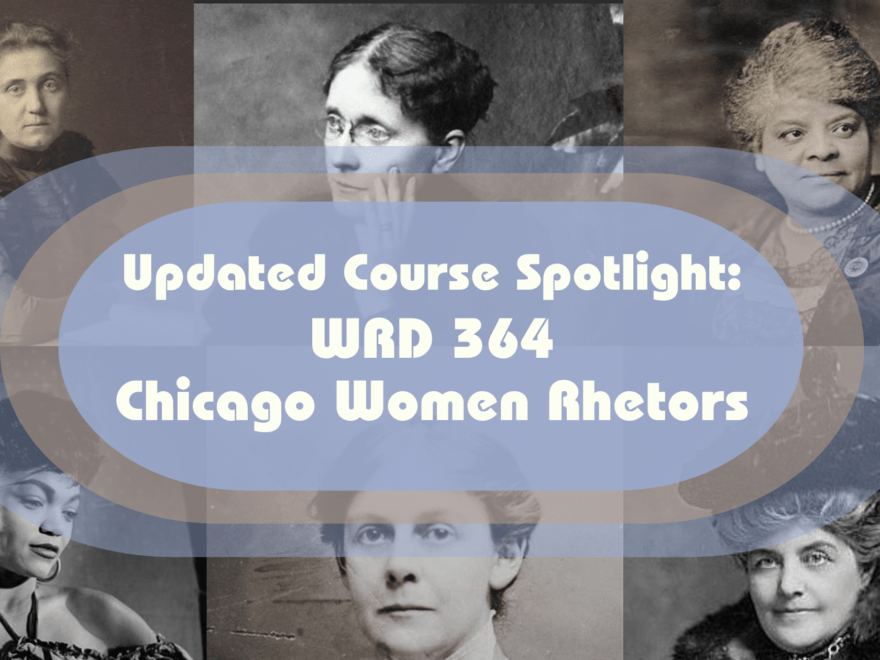Chicago has a long history of women speaking and getting things done. Who are the women who have made their mark on our city? What did they say, how did they say it, and do people know about them?
WRD 364 Chicago Women Rhetors guides students to answer these questions and more, offering the opportunity to both study history and write it. Read on to learn more about this unique course, which will be taught in Autumn Quarter 2024 by Dr. Julie Bokser.
Course Overview
Summarizing the course, Dr. Bokser shared, “It’s at the intersection of rhetoric – feminist rhetoric, specifically – history, public memory, and writing.“ Applying a feminist rhetorical lens, the course will examine how the work of women rhetors (speakers and writers) has been documented, interpreted, and remembered. After learning about several women rhetors in depth, students will have the opportunity to contribute to public memory as well by researching a Chicago woman rhetor of their choosing and writing a memorial and a Wikipedia entry based on their research.
Content and Projects
The course focuses on figures whose work intersects with the 1893 World’s Fair, an event that Dr. Bokser notes was “a watershed moment in US history and one that really put Chicago on the map.” In previous versions of the course, these figures have ranged from businesswomen, humanitarians, scientists, and activists, including Jane Addams, Bertha Palmer, Ida B. Wells, Alice Hamiliton and Frances Willard.
Delving into the lives and works of these various women allows the class to paint a fuller picture ofthe activity going on in the city during this period of great change. Students will engage with artifacts of language, cultural practices, museums, sculptures, buildings, and organizations to deepen their sense of history and gain insight into the time period and these remarkable individuals.
Then, students will focus on their own research project, which involves collecting primary and secondary source information on a Chicago woman rhetor of their choice (from any time period). Students will apply their research into several genres of writing for various audiences, including an Instagram slideshow and a published Wikipedia entry. In doing so, students can participate in writing public memory by memorializing figures they find important and helping educate the public about these figures’ lives.
Class-Generated Wikipedia Entries
Wikipedia is often the first stop people make when they want to find out about a topic or person in more depth. However, Dr. Bokser notes that there are many statistics showing that women and minority figures are underrepresented on Wikipedia. This is part of the reason why Wikipedia articles are a main project of WRD 364–students can boost public knowledge about important lives that may otherwise remain unknown. Writing for Wikipedia has the potential to reach a truly expansive audience.
Dr. Bokser is trained in Wiki Edu, which helps universities incorporate Wikipedia writing and editing into their courses, an undertaking nearly 130,000 students have been through. According to Wiki Edu, the benefits of this are twofold: students get research, writing, and style guide experience in a new context, and Wikipedia is able to publish their vetted articles with the advantage of included library resources that university students have access to.
The way we write and remember history is key in shaping culture, and through Wiki Edu, WRD 364: Chicago Women Rhetors offers students a unique way to engage in the process of public memory.
Key Takeaways
Commenting on the public memory aspect of the course, Dr. Bokser shared, “It’s important to know our history, and to realize many official versions are still pretty lacking. How we tell history is a fundamental rhetorical activity. And, in light of recent controversies about which statues and other public art should be featured in public spaces, the issues we’re examining are extremely real and relevant.”
Students will also gain skills in research, following a style guide, practicing a variety of writing genres, and creating sophisticated presentations of research findings that are meaningful to them and a wide audience.
Finally, Dr. Bokser wants students to know that “this a fun class! We’re thinking about how we can use writing to make a difference, and the connection we have to history–we’re not just reading history, we’re writing it, too.”
WRD 364 is typically taught only every 3-4 years, so interested students should take the opportunity now if they are interested! Sign up for the course on Campus Connect, and stay up to date with WRD course offerings in the blog’s Course Spotlights section.
